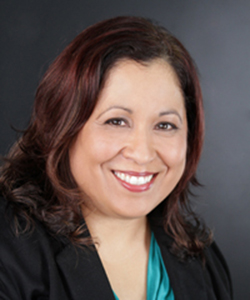Dr. Sandra L. Guzman Foster Joins Editorial Board of Journal of Trauma Studies in Education
 Dr. Sandra L. Guzman Foster, associate professor in Education and Sister Theophane Power Endowed Chair at the Graduate Studies Program, has been invited to join the editorial board for the Journal of Trauma Studies in Education (JTSE), an online open-access academic peer-reviewed journal dedicated to the generation of knowledge in mental health and well-being with a focus on the impact of traumatic stress in Pre-K through 12th grade and postsecondary education.
Dr. Sandra L. Guzman Foster, associate professor in Education and Sister Theophane Power Endowed Chair at the Graduate Studies Program, has been invited to join the editorial board for the Journal of Trauma Studies in Education (JTSE), an online open-access academic peer-reviewed journal dedicated to the generation of knowledge in mental health and well-being with a focus on the impact of traumatic stress in Pre-K through 12th grade and postsecondary education.
“As a member of the editorial board, I hope not only to identify research that will be useful and informative for educators across the spectrum when it comes to issues related to trauma but also to learn from the rest of my peers who are on the editorial board,” said Dr. Guzman-Foster.
“I see this as a great opportunity to work with and learn from scholars and experts across the country who are well versed in trauma and education. I look forward to disseminating information that will help educators in K-12 and higher education enhance their practices in ways that help students who have or are experiencing trauma.”
The Journal of Trauma Studies in Education invites new submissions from a variety of disciplines, epistemologies, and backgrounds focusing on the nature and impacts of trauma within the context of education. The first release of the journal will be this fall.
“Our goal as an editorial board is to start off with a national scope and in a few years go from a national scope to an international scope. We are excited about the possibilities that lie ahead and the impact the journal will have on trauma and educational studies,” said Dr. Guzman-Foster.
Dr. Guzman-Foster explains the importance of mental health and well-being in traumatic and stressful situations that affect educational settings. “Right now, we are experiencing a different world with COVID-19, the social and civil unrest ignited by the death of George Floyd and other injustices, remote learning for all learners, both K-12 and higher education, and the attack on the Capitol has resulted in a plethora of emotions and struggles among many people, including students and faculty. Witnessing these events has led many people to experience secondary trauma or the reopening of wounds from past traumatic experiences. Many people cannot unsee what has been displayed online. Additionally, knowing that many of our loved ones passed away from COVID-19 in hospitals alone with no family around have also been a traumatic experience for many people.”
“So where do we go from here? We share what scholars from around the country (in the future around the world) know about helping people to cope with such trauma in both educational and professional environments. There is no way we can go back to what life was like pre-pandemic because so many of our lives have been impacted by what has been occurring. By sharing knowledge on mental health and well-being with a focus on the impact of trauma we feel it will provide ways for those in charge of educational environments to rethink their practices and policies so people in K-12 and higher education can learn and flourish in education while at the same time healing from the trauma they are experiencing or have experienced.”
Dr. Guzman-Foster has a Ph.D. in Educational Leadership and Policy Studies. She is a Gates Millennium Scholar and a Spencer Interdisciplinary Fellow. Prior to joining UIW, Dr. Guzman-Foster worked with the Institute for Transformational Learning at the University of Texas Systems developing and producing competency-based instructional materials. Her experience includes online and hybrid pedagogy, curriculum development, teacher education, program evaluation, and educational research. Dr. Guzman Foster taught at the K-12 level, community college level, and at the university level in Texas, Arizona, and Colorado over the past 25 years.
